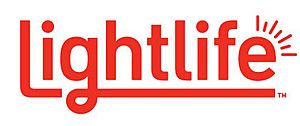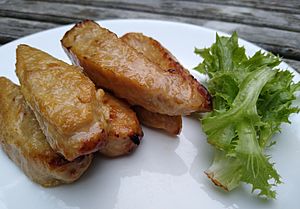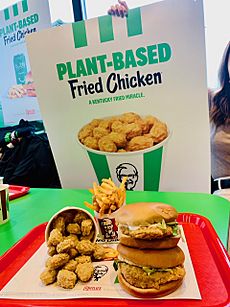Lightlife facts for kids
 |
|
| Wholly-owned | |
| Industry | Food |
| Genre | Food manufacturing |
| Founded | 1979 |
| Headquarters |
Turners Falls, Massachusetts
,
United States
|
|
Key people
|
|
| Products |
|
| Owner |
|
Lightlife Foods is a company that makes yummy foods for people who choose to eat plant-based diets. This means their products are made from plants, not from animals. In 2018, the company was worth about $80 million.
Lightlife is famous for its plant-based veggie dog, called Smart Dog. This popular product first came out in 1993. In 2019, Lightlife also started selling a plant-based burger. This burger was made to compete with other popular plant-based brands like Impossible Foods and Beyond Meat. Lightlife Foods is also a carbon-neutral company, which means they try to balance out the carbon they put into the air.
Contents
History of Lightlife Foods
Lightlife was started in Greenfield, Massachusetts in 1979. It was founded by Michael Cohen and Chia Collins. The company first moved to Turner Falls, Massachusetts, in 1998.
How Lightlife Started
When it first began, the company was called Tempeh Works. It was set up in an old, converted car wash! The main product they made was tempeh, which is a food made from fermented soybeans. In 1984, the company officially changed its name to Lightlife.
Chia Collins, one of the founders, said they were just "two hippies" who loved vegetarian eating. They didn't plan to build such a big company. They just wanted to share the "wonders of the soybean."
Growing the Product Line
Over time, Lightlife started making more plant-based meat alternatives. Some of their first products included Tofu Pups, Fakin Bacon, and Phoney Bologna. These were later updated with new recipes and names like Smart Sausage, Smart Bacon, and Smart Deli. They also created the popular Gimmie Lean Sausage. The name was a fun play on the Jimmy Dean sausage brand.
Changes in Ownership
In the summer of 2000, a larger company called ConAgra Foods bought Lightlife Foods. At that time, Lightlife was making about $25 million in sales each year. The natural foods industry was changing, and bigger companies were buying smaller ones. Lightlife needed to join a larger company to compete.
Michael Cohen, who was Lightlife's CEO, said that the deal would help Lightlife stay in its Turners Falls location. It also meant that its 145 employees would keep their jobs. The company also wanted to keep its focus on helping the community.
In 2010, ConAgra moved some of Lightlife's office jobs to its main office. But Lightlife still remained one of the biggest employers in the area by 2013. The company continued to support the local community. They donated to events like the Green River Festival and the Greenfield Triathlon. They also supported Monte's March, which raises money for the Food Bank.
In September 2013, a company called Brynwood Partners bought Lightlife from ConAgra Foods. Lightlife had about 90 employees then. Later, in 2017, Maple Leaf Foods bought Lightlife Foods for $140 million.
New Products and Growth
In 2019, Lightlife introduced a new plant-based burger. This burger was made with pea protein, garlic powder, and beet powder for color. It was first sold in restaurants before coming to grocery stores. Lightlife usually used soy protein and tempeh for its products. But for this burger, they used pea protein, coconut oil, and beet powder. Pea protein gives a meatier texture, similar to what competitor Beyond Meat uses.
To make enough products for everyone, Lightlife Foods' parent company, Greenleaf Foods, started building a new food processing plant in Shelbyville, Indiana, in 2019. They also bought a lot of pea protein that year. This Shelbyville plant was planned to be "North America's biggest plant-based protein facility." It cost $310 million and was expected to make 60 million pounds of plant-based meat each year. This would double the production for Lightlife and another brand called Field Roast.
In March 2020, before the COVID-19 pandemic, sales of plant-based meat were already growing fast. By May 2020, sales of fresh meat alternatives jumped by 255%. This was partly because it was harder to get traditional meat during the pandemic. In June 2020, Lightlife Foods expected its sales to grow by 30% that year, even though restaurant business was down. In 2020, the company's sales increased by about $25 million compared to the year before.
Partnerships and Expansion
In 2019, Lightlife Foods partnered with Soldier Field in Chicago. This meant Lightlife's plant-based burgers would be sold at home games for the Chicago Bears football team. In October 2020, Lightlife also made a deal with Bowlero Corporation, which runs bowling alleys. Lightlife's plant-based burger would be sold at Bowlero and Bowlmor Lanes locations. Lightlife also sponsored the 2020 PBA Tour for bowling.
In January 2021, Greenleaf Foods, Lightlife's parent company, announced they would buy a food processing plant in Indianapolis, Indiana. This plant would only make tempeh products. The cost was about $100 million. Dan Curtin, the President of Greenleaf Foods, said that Lightlife Tempeh made up about 80% of all tempeh sales in the US in 2020. Lightlife's tempeh products are now sold in over 18,500 stores. They expanded into 3,500 Walmart stores in November 2020.
Products
Lightlife Foods makes many different products using tempeh, soy protein, and pea protein.
- Smart Dogs - These are plant-based veggie dogs that first came out in 1993. They were originally made with soy protein. In 2012, they were updated to include pea protein too.
- Plant-Based Burger - Launched in 2019, this burger is made with pea protein, coconut oil, and beet powder. It was sold at Harvey's restaurants in Canada and at Dave & Buster's restaurants in the United States and Canada. Harvey's stopped selling the Lightlife burger in July 2022.
- Plant-Based Chicken - Lightlife Smart Tenders are plant-based chicken pieces made with soy protein. In August 2020, Lightlife plant-based chicken became a regular menu item at KFC restaurants in Canada.
Advertising Campaigns
Lightlife has created some interesting advertising campaigns to promote its products.
"A Taste of Honesty" Campaign
In 2019, Lightlife launched a campaign called "A Taste of Honesty." It featured actors Kristen Bell and Dax Shepard. The campaign was shared on social media with a two-minute video and the hashtag #ATasteOfHonesty. The ad was even chosen as "ad of the day" by AdWeek on October 8, 2019.
"Clean Break" Campaign
On August 25, 2020, Lightlife published an open letter in newspapers like The New York Times and The Wall Street Journal. In this ad, Lightlife challenged its competitors, Impossible Foods and Beyond Meat. Lightlife said that their competitors used "unnecessary additives, fillers, and fake blood" in their plant-based burgers.
Impossible Foods responded by saying Lightlife's campaign was "disingenuous" and a "desperate disinformation campaign." They said Lightlife was trying to make people doubt their products.
Lightlife Foods also worked with vegetarian late-night host Lilly Singh for an Instagram campaign. This campaign was called "Make a Clean Break with Lilly Singh" and continued the "Clean Break" theme. In the campaign, Lilly Singh gave advice to her followers about making a "clean break" from things in their lives.
See also
 | Jackie Robinson |
 | Jack Johnson |
 | Althea Gibson |
 | Arthur Ashe |
 | Muhammad Ali |



